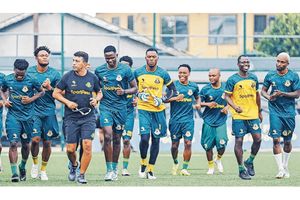Makonda faults militia over assault of Dar businessman

Dar es Salaam Municipal Cleaner Stake Holders pay attention during a meeting with their Region Commissioner in the city yesterday. PHOTO | SAID KHAMIS
What you need to know:
- Speaking during a meeting with officials from public and private sector bodies in Dar es Salaam yesterday, Mr Makonda, who recently came under fire over containers tax saga, said the city’s auxiliary police were not mandated to mete out corporal punishment. “If they encounter resistance when discharging their duties, they should report to the ward executive officer who may decide to engage the police for further action,” he said.
Dar es Salaam. The Dar es Salaam Regional Commissioner, Mr Paul Makonda, yesterday condemned auxiliary police’s assault of a businessman, Mr Robson Orotho, in the ongoing cleanness campaign.
Speaking during a meeting with officials from public and private sector bodies in Dar es Salaam yesterday, Mr Makonda, who recently came under fire over containers tax saga, said the city’s auxiliary police were not mandated to mete out corporal punishment. “If they encounter resistance when discharging their duties, they should report to the ward executive officer who may decide to engage the police for further action,” he said.
Last month, a video clip showing a militiaman beating Mr Orotho, went viral on social media, creating a public outrage. He said it was only fair that the law had to take its course when those accused of being involved in the assault were arrested and arraigned.
Meanwhile, Mr Makonda revealed that so far a total of 11,669 people have been apprehended from different locations in connection with their failure or unwillingness to abide by the bylaw governing the city cleanup campaign.
Six of them have been charged in court.
During the period, Mr Makonda said Sh346.6 million was collected in fines from 6,577 people while 4,443 people were set free.
Some 346 people had their cases referred to higher authorities while 2,213 were told to do community service.
“It’s not our intention to collect revenue rather emphasise the public on the importance of cleaning the surroundings. Half of the revenue collected is spent on paying the auxiliary police, “he said.



